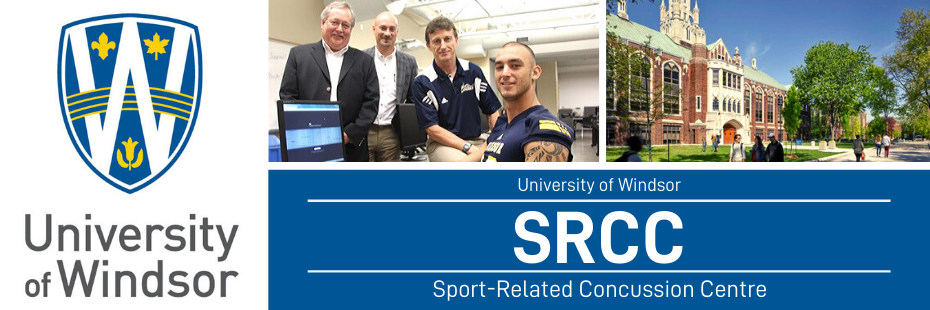Are you seeking concussion management services? Contact us at concussion@uwindsor.ca.
What is a concussion?
According to expert consensus (link to NRL.com, PDF document), concussion (also known as mild traumatic brain injury or mTBI) is a complex type of injury. It can be caused either directly by a blow to the head (often occurring during sport injuries or falls) or indirectly through force transmitted to the head from elsewhere in the body.
Concussion results in rapidly-emerging, temporary disturbance of brain functioning. In most cases, people recover from concussions (particularly those that result in 30 minutes or less of unconsciousness) within a few days to a few weeks.
Signs of concussion to look for
In their guidelines for concussion management, the Ontario Neurotrauma Foundation suggests that players should be removed from play if concussion is suspected, and should not return to play (or drive or be left alone) before they are assessed by a knowledgeable professional. Visible signs of concussion include loss of consciousness/responsiveness, lying motionless on the ground/slow to get up, balance/coordination changes, grabbing head, blank look, or confusion.
Following concussion, may people experience cognitive symptoms (difficulties concentrating, thinking, remembering), emotional symptoms (irritability, depression, anxiety/worry), and physical/sensory symptoms (getting tired easily, headaches, dizziness, blurry/double vision, sensitivity to light). It is important to note that most people who have not experienced concussion also experience these symptoms from time to time.
When to seek medical attention
According to Ontario Neurotrauma Foundation’s guidelines for concussion care, players experiencing any of the following “red flags” should seek medical attention immediately:
- Complaint of neck pain
- Increased confusion/irritability
- Repeated vomiting
- Seizure or convulsion
- Weakness/tingling/burning in arms or legs
- Deteriorating conscious state
- Severe or increasing headache
- Unusual behavior change
- Double vision
What to do following concussion
Following a concussion, it is important to pace yourself. Recovery is usually quicker among people who resume activities gradually following a concussion. A healthcare or mental health professional, such as the SRCC team, can help you make sure that you resume activity following concussion at a pace that ensures quick recovery.
For more information about concussion and concussion care, visit the Resources page.
Please note: This page is not intended to be a substitute for medical attention. If you suspect that you or someone you know has sustained a concussion, contact a knowledgeable medical professional. If you are seeking concussion management services, contact us at concussion@uwindsor.ca.

